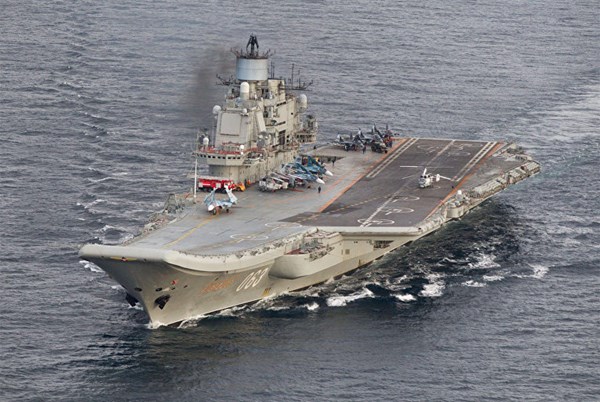Analyst: Russian aircraft carrier Admiral Kuznetsov is almost useless in the Mediterranean Sea
Russia’s aircraft carrier Admiral Kuznetsov, which is sailing to the coasts of Syria, will be almost useless in the Mediterranean Sea and definitely will not be able to influence the situation with a blockade or a possible attack of Aleppo. This was the opinion expressed by an analyst from Novaya Gazeta, Pavel Felgenhauer.
“It took almost a month for the crossing, and the average speed was less than nine knots. More than a thousand years ago, the Vikings could pass the same route on ltheir boats much faster with the right wind. The slow-moving Kuznetsov will be almost useless in the Mediterranean Sea and certainly will not be able to influence the situation in Aleppo. To be able to launch aircraft with full operational loading, the aircraft carrier should be moving at full speed against the wind. Of course, Kuznetsov may launch aircraft for a TV-show, but without ammunition. In fact, it’s only for show,” Felgenhauer believes.
According to Felgenhauer, a Russian squadron may fire cruise missiles at Syria from ships and submarines, but the Kalibr NK cruise missile has a range of more than 2000 km, “so there was no point in trudging Kuznetsov and Pyotr Velikiy to the Syrian coasts. [They] have the old supersonic anti-ship cruise missile P-700 Granit which are meant to hit large ships.”
“In principle, Granit missiles can be used to hit targets on the ground, but it’s not very effective. However, high-precision Kalibr NK missiles are also expensive – up to six million dollars each – and designed to destroy stationary targets identified in advance, in conditions of a strong enemy air defense when there is no way through for a bomber or an attack aircraft,” he stated.
“The use of the Kalibr NK for attacks on fighters from the Syrian opposition, who are using pickups with machine guns, is an insanely expensive "firework", like that of the Sochi Olympic games,” the analyst added. “Of course, there are several new MiG-29K and Kа-52K attack helicopters on Kuznetsov that, probably, can strike one or two times at Syrian opposition groups, but it won’t make any difference. It seems that the command of the Russian Navy and the General Staff do not believe that the Syrian crisis will lead to a big [confrontation] wth the United States and NATO, so they can act up, trying to show that they have air striking force similar to Americans.”
According to Felgenhauer, the Pyotr Velikiy battlecruiser “also has nothing to do in the Mediterranean’s shallow waters.”
“A voyage of Kuznetsov and Pyotr Velikiy in fact, has little to do with an attack on Aleppo, and our sincere indignation at individual countries’ positions [Spain, Malta and likely Algeria] is understandable. [They] refused to allow warships to enter their ports.
“It’s probably not about American pressure – Washington is not up to that because of the elections – but more about an increasing public outrage in Europe and the Muslim Sunni world which, as a result, can isolate Moscow as much as [they did] during the Afghan war in the 80s,” Felgenhauer said.
Recently, Defense Minister Sergey Shoygu stated that the Russian seaborne aircraft carrier group led by the battlecruiser Pyotr Velikiy arrived in the Mediterranean Sea. He stated that “a voyage of our ships caused alarm among Western partners.”
“But especially we were surprised by the position of individual countries which, under the pressure of the United States and NATO, publicly refused to allow our ships to enter their ports. It’s time for western partners to decide whom they are really fighting with: terrorists or Russia,” Shoygu advises.
The minister added that the refusal of individual countries to let the ships from the Russian Navy enter their ports did not affect their movement towards the Mediterranean.
Earlier it was reported that the deployment of the Admiral Kuznetsov to the coasts of Syria led to increased tension between Russia and NATO. Then, German Defense Minister Ursula von der Leyen stated that NATO is closely monitoring the movement of the Russian aircraft carrier group in the Mediterranean Sea, the presence of which is considered acceptable by the alliance.
“It is acceptable that the Russian aircraft carrier is moving in international waters, but in the current special circumstances we will closely monitor it,” von der Leyen said.
